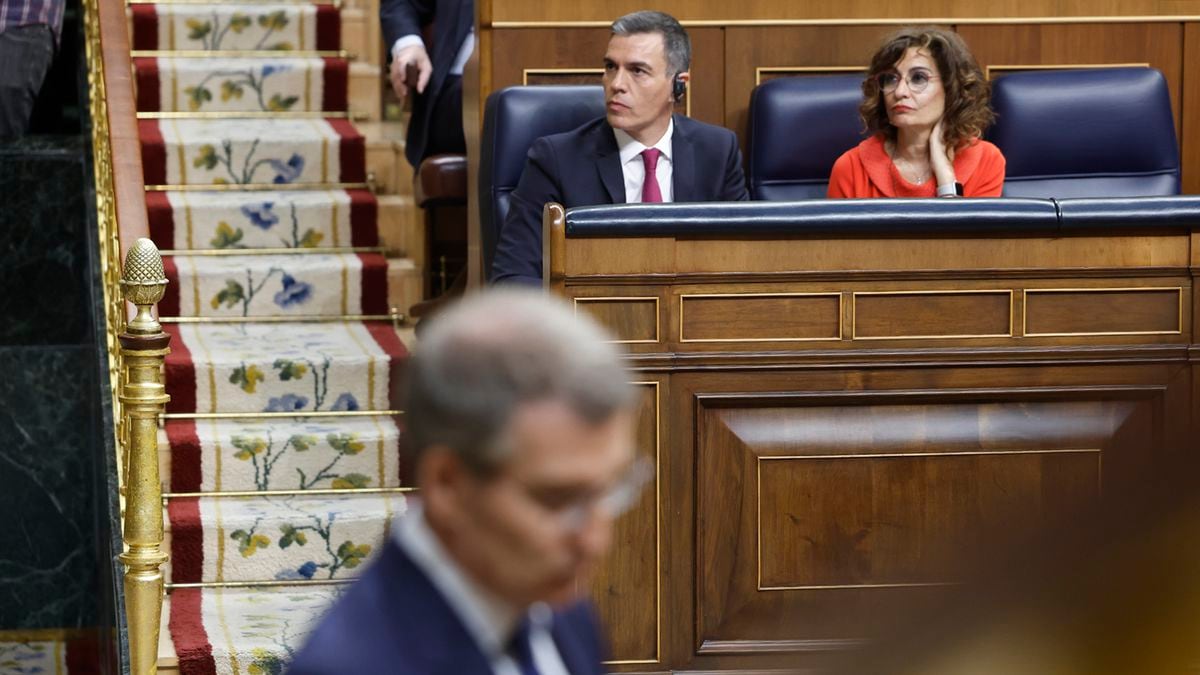A waitress works in a bar in Toledo.ISMAEL HERRERO / EFE
The arrival of the coronavirus has revolutionized all the priorities of the authorities in the blink of an eye.
Governments have had to turn to health care and have designed shock measures to sustain the productive fabric and families during confinement.
Now, after the de-escalation and in the face of a future that remains uncertain, the Organization for Economic Cooperation and Development (OECD) recommends maintaining fiscal support "for as long as necessary" to boost the recovery and avoid falling into the trap of austerity.
"Measures must be well targeted and withdrawn slowly when the situation improves," reads the fifth edition of the
Tax Policy Reforms 2020 report
, published this Thursday by the agency, which recommends that green taxes and levies on property and capital gains gain weight in the reconstruction phase.
"Once the countries come out of the crisis and the economies recover, the governments will begin to look for how to restore public finances, but it is possible that they will not be able to resort to traditional recipes", the editorial of the report, signed by Pascal Saint- Amans, director of the Center for Tax Policy and Administration of the Paris-based body.
In other words: the time has come to start thinking about structural reforms that will close the gap that the pandemic has generated in public accounts, but without these implying a return to the starting square.
On the contrary, the club of advanced economies suggests that this crisis is a stimulus to "rebuild better" and seek alternative sources of income, starting with promoting environmental taxation - "a central priority" -, which still has a small weight in the OECD revenue: 1.5% of GDP on average in 2018.
"Raising taxes on labor and consumption, as was done in the wake of the 2008 global financial crisis, can be politically difficult and, in many cases, undesirable from an equity perspective," the report clarifies.
According to the agency, in addition to environmental taxation, taxes on property and capital income will also play an important role in recovery, especially in a "context of significant improvements in international tax transparency."
In this sense, it foresees that the need for financing caused by the crisis will provide a new impetus to the design of a global digital rate, in which the OECD has been working for years and whose progress has recently been slowed by the outbreak of the pandemic and the US decision to back off from negotiations.
“Increased pressure on public finances, as well as growing demands for greater equity, should provide new impetus to reach an agreement on digital taxation.
Fiscal cooperation will be even more necessary to prevent fiscal disputes from turning into trade wars, which would damage the recovery at a time when the world economy can least afford it, ”the agency concludes.
Trends
The report published this Tuesday, which annually dissects the main changes in the fiscal policies of the club members and a handful of other economies - in total, 40 countries in the 2020 edition -, this year emphasizes the measures launched to face the health emergency, although it also includes the main trends in tax matters observed before the outbreak of the crisis.
Among them, reductions in personal income tax for the middle classes and the nominal rate of corporation tax, as well as signs of an increase in wealth tax.
In general, the tools launched just after the outbreak of the health emergency have been aimed at keeping households and families afloat through instruments of liquidity and protection of employment and income - although their magnitude and scope vary depending on the country.
Aids that have been extended later, as the confinement was prolonged.
Among the most used measures to guarantee liquidity is tax deferral, an instrument that has been adopted by more than three-quarters of OECD partners.
Spain has also included this provision in its anti-crisis package, while direct aid instruments have been more modest than in the other large economies.
With the progressive de-escalation, public support has begun to focus on recovery, for example towards investments linked to the ecological transition or the granting of tax credits, while employment protection schemes and related losses have been expanded. Covid-19, with a significant gap between advanced and emerging economies.
Even so, the agency warns that the future is uncertain.
Even before the pandemic, the growth of the world economy was fragile and slowing winds were blowing, due to the trade war between the US and China and the international uncertainty caused by events such as Brexit.
But nobody expected such a bump: in the second quarter of the year, the GDP of the OECD countries as a whole fell by 9.8% ―18.5% in Spain―, after having already fallen by 1.8% between January and March and plunging the club into recession.
According to the forecasts made by the agency in June, in the event of a rebound, the fall in global GDP would reach 7.6% this year.
Even in the worst moment of the financial crisis, the setback was not so great.
With the aggravating circumstance that public accounts are now much less in shape, inherited from the crash of the past decade: in 2019, a debt-to-GDP ratio of 110% on average in the OECD, compared to 74% in 2007, and a deficit of 3.3%.
The confinement measures adopted to curb the contagion and the increase in public spending to attend the emergency will shoot these red numbers towards even higher levels, never seen in times of peace.
The OECD recalls that the evolution of the collection usually goes hand in hand with that of the GDP, but that it tends to fall more rapidly.
"Estimating the impact of COVID-19 on world GDP remains a highly speculative exercise, but early estimates suggest that the impact on tax revenue is likely to be significant," the report says.
And he warns that, if in the short term the decline in public revenues has been linked to restrictions to curb contagion, in the long term it will depend "largely on the effectiveness of political responses."

/cloudfront-eu-central-1.images.arcpublishing.com/prisa/W7GEBMEA3FA4RBMJZWRG72BAEU.aspx)













